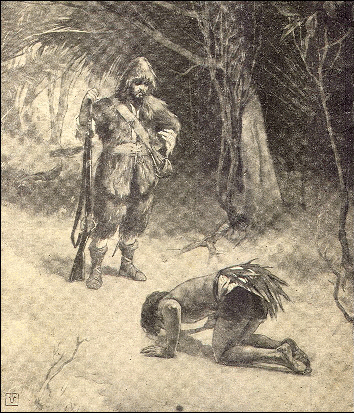I showed him my ladder and made him go up over the wall.
Then I led him into my castle, and he became my servant.
I thought in my sleep, that I cried aloud for joy and said: "Now I shall escape from this place. For this savage will be my pilot. He will guide me to the mainland. He will tell where to go and what to do. He will help me find my own people."
This thought filled my mind with great joy and while I was still rejoicing I awoke.
What a disappointment it was to find that it was only a dream!
For several days I felt very sad. I was almost ready to give up hope.
Then I remembered my dream; and I said to myself: "If I could only get hold of a savage and teach him to love me, things might turn out just that way. He must be one of their prisoners and I must save him from being eaten; for then it will be easy to win his friendship."
This thought so fixed itself in my mind that I could not get rid of it. Waking or sleeping, I seemed to be always planning to get hold of a savage.
At last I set myself about it in earnest. Almost every day I went out with my gun to see if some of these wild men had not again landed on my island.
I GET HOLD OF A SAVAGE
(я захватываю дикаря)
FOR a year and a half I kept close watch upon the farther shore of the island as well as upon that nearest to my castle (в течение полутора лет я держал постоянное наблюдение за дальним берегом острова, равно как и за тем /берегом, который был/ ближайшим к замку). But not a single savage came near (но ни один дикарь не приблизился = не появился; single — один; единственный; одиночный).

One morning in June, however (однако одним июньским утром), I had a great surprise (я получил большое удивление = случилось неожиданное для меня).
I was just starting out from my castle (я как раз выходил из моего замка) when I saw five canoes lying high and dry on the beach not a mile away (когда увидел пять каноэ, лежащих вытащенными на берег: «высоко и сухими» на берегу не более мили вдалеке = на расстоянии не более мили; high and dry — выброшенный, вытащенный на берег /о судне/). There was not a man near them (не было ни одного человека рядом с ними). The people who had come in them were perhaps asleep among the trees (люди, которые прибыли на них, возможно, спали между деревьями).
The number of canoes was greater (число каноэ было больше) than I had ever counted upon seeing (чем я когда-либо рассчитывал увидеть). For there were always four or six savages in each canoe (потому что в каждом каноэ всегда было четыре или шесть дикарей; always — всегда, неизменно), and there must now be between twenty and thirty men somewhere on the shore (и /значит/ должно быть между двадцатью и тридцатью мужчин где-то на берегу).
I did not know what to think of it (я не знал, что думать об этом). I did not feel brave enough to attack so many (я не чувствовал себя достаточно смелым, чтобы напасть на столь многих).
So I stayed in my castle (поэтому я остался в замке) and made ready to defend myself (и приготовился защищаться: «защищать себя»).
"There is little hope of getting a savage this time (мало надежды заполучить дикаря в этот раз)," I thought to myself (подумал я про себя).
I waited a long while (я ждал долго), but heard no unusual sound (но не услышал никаких необычных звуков). I grew tired of waiting (я устал: «стал уставшим» от ожидания = мне надоело ждать; to grow — становиться; tired — усталый, уставший; потерявший интерес, пресытившийся), and made up my mind to see what was going on (и решил посмотреть, что происходило).
So, with the help of my ladder (итак, с помощью лестницы), I climbed up to my lookout on the top of the rock (я взобрался на мою смотровую площадку на вершине скалы). I put my spyglass to my eyes (я приставил подзорную трубу к глазам) and looked down upon the beach (и посмотрел вниз на берег).
